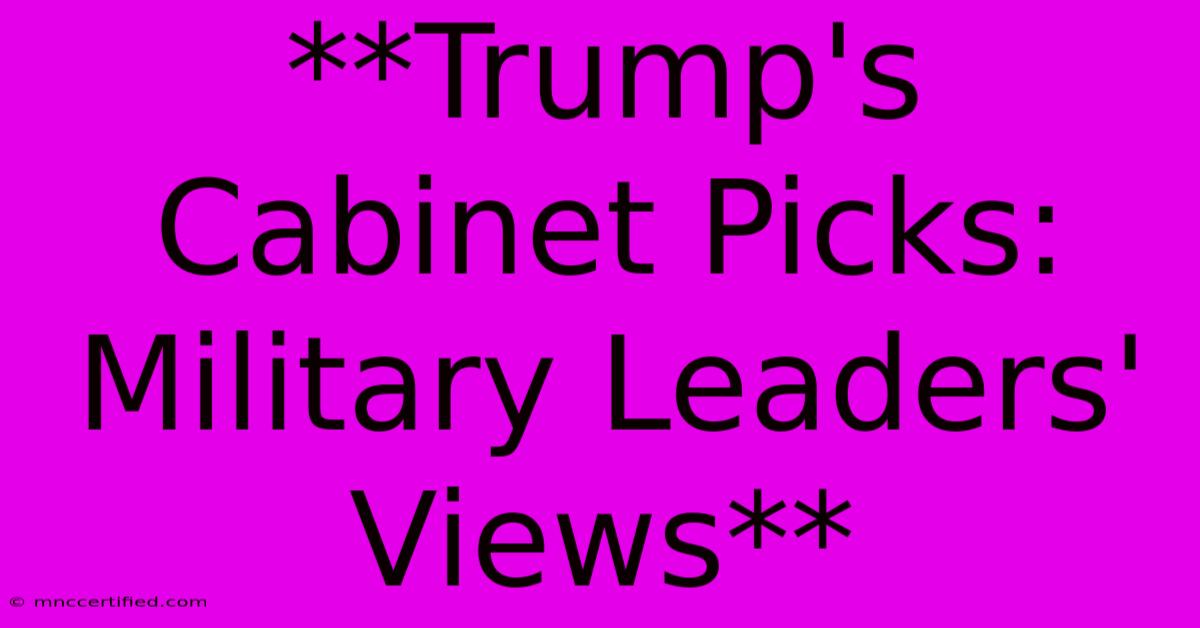**Trump's Cabinet Picks: Military Leaders' Views**

Table of Contents
Trump's Cabinet Picks: Military Leaders' Views on the President's Choices
Donald Trump's presidency was marked by a number of controversial cabinet picks, particularly in the realm of defense and national security. Several individuals with strong military backgrounds were appointed to key positions, raising questions about their political leanings and potential influence on policy. This article examines the views of prominent military leaders on Trump's choices for his cabinet, focusing on their perceived strengths and weaknesses.
General James Mattis: A Respected Figure with Concerns
James Mattis, a retired four-star Marine Corps general, was appointed as the Secretary of Defense in 2017. Mattis, known for his experience in combat and his tough stance on national security, was widely seen as a stabilizing presence in Trump's administration.
While Mattis's appointment was praised by many in the military, some expressed concerns about his potential to be overshadowed by Trump's often impulsive and unpredictable decision-making. The former chairman of the Joint Chiefs of Staff, General Martin Dempsey, voiced this concern, stating that Mattis would need to be "very, very clear in his advice to the president" to maintain his independence.
John Kelly: A Disciplinarian with a Different Approach
John Kelly, a retired four-star Marine Corps general, served as White House Chief of Staff from 2017 to 2018. Kelly, a decorated officer with experience in Iraq and Afghanistan, brought a strong sense of discipline and order to the White House, which was seen as a necessary change after the chaotic first few months of Trump's presidency.
However, Kelly's management style was criticized by some as too rigid and inflexible. Former Defense Secretary Robert Gates, a Republican with close ties to the military establishment, expressed concern that Kelly's "rigidly hierarchical management approach" might hinder the flow of information and decision-making within the White House.
H.R. McMaster: A Strategist with a Focus on Russia
H.R. McMaster, a retired three-star Army general, served as National Security Advisor from 2017 to 2018. McMaster, known for his academic background and strategic thinking, brought a focus on Russia and the evolving nature of global threats to the White House.
McMaster's appointment was generally well-received, with many praising his expertise and analytical skills. However, he faced criticism for his perceived lack of experience in Washington's political landscape and for his clashes with other White House officials, particularly those with closer ties to Trump's inner circle.
John Bolton: A Hawk with a Strong Foreign Policy Stance
John Bolton, a former U.S. ambassador to the United Nations, served as National Security Advisor from 2018 to 2019. While not a military officer himself, Bolton holds a staunchly hawkish worldview on foreign policy and has long advocated for aggressive military action against perceived threats.
Bolton's appointment was met with mixed reactions, with some praising his strong foreign policy credentials and others expressing concern about his tendency to prioritize military solutions over diplomacy. Former Secretary of State Madeleine Albright, a Democrat who served in the Clinton administration, voiced her concerns about Bolton's "long history of advocating for preemptive war and unilateralism," arguing that his appointment could lead to increased instability in the world.
Conclusion: A Mixed Bag of Influences
While the presence of military leaders in Trump's cabinet was seen by many as a sign of his commitment to national security, their influence on his administration was ultimately mixed. Some, like Mattis, were seen as stabilizing forces, while others, like Bolton, pushed for more aggressive foreign policy actions. The extent to which these individuals shaped Trump's decisions remains a subject of debate, but their presence certainly added a unique dimension to his presidency.
It's important to note that these are just a few examples of military leaders who served in Trump's cabinet. Other prominent figures, such as General Michael Flynn, who served as National Security Advisor for a short period, also contributed to the administration's approach to national security. The impact of their views and experiences on Trump's policies remains a subject of ongoing research and analysis.

Thank you for visiting our website wich cover about **Trump's Cabinet Picks: Military Leaders' Views** . We hope the information provided has been useful to you. Feel free to contact us if you have any questions or need further assistance. See you next time and dont miss to bookmark.
Featured Posts
-
Third Ind Vs Sa T20 I Reason For Halt
Nov 14, 2024
-
Simple Investment Agreement Doc Free
Nov 14, 2024
-
John Krasinski Hottest Roles To Watch
Nov 14, 2024
-
Special Event Insurance Application
Nov 14, 2024
-
Skai Jackson Supports Partner Amidst Allegations
Nov 14, 2024